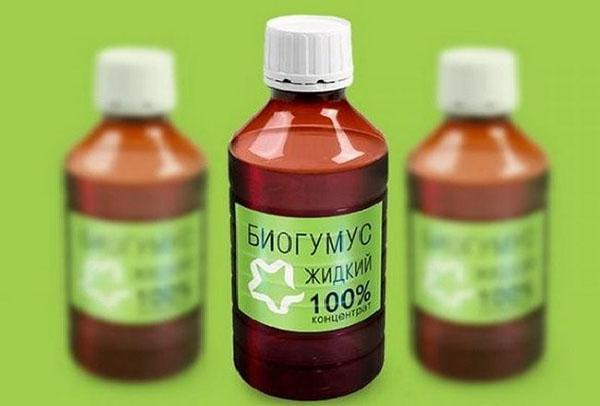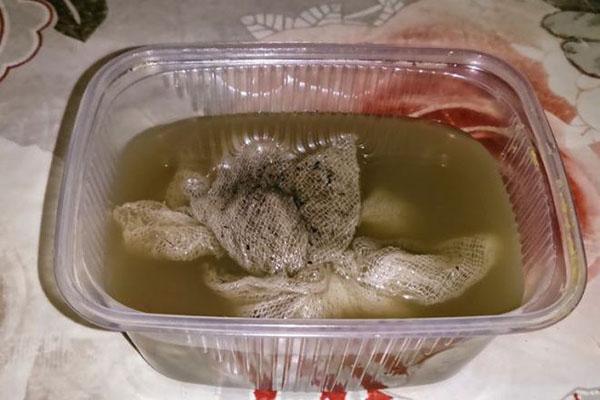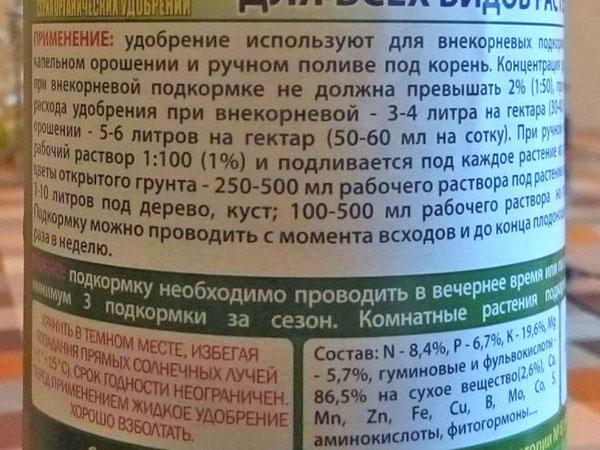Universal fertilizer - liquid biohumus
 An organic fertilizer containing microorganisms useful for soil and plants was named liquid biohumus. Its main component is compost processed by red Californian worms (or their analogue - the Russian Moscow hybrid), which significantly improves the fertility of the soil composition.
An organic fertilizer containing microorganisms useful for soil and plants was named liquid biohumus. Its main component is compost processed by red Californian worms (or their analogue - the Russian Moscow hybrid), which significantly improves the fertility of the soil composition.
Components
In addition to processed manure, the composition of vermicompost includes:
- phosphorus (2%);
- potassium (> 3 grams in 1 liter);
- nitrogen (up to 2%);
- calcium (up to 6%);
- amino acids, vitamins, phytohormones.
- trace elements in small doses (zinc, molybdenum, iron, copper, magnesium, manganese, cobalt, boron);
- humic acids.
Top dressing contributes to the creation of an optimal acidity level in the soil, pH = 7.5.
Presale preparation of top dressing by manufacturers includes its thorough cleaning from eggs of parasites, weeds.
Instructions for the use of liquid biohumus

Manufacturers 'recommendations and gardeners' practical experience confirm the beneficial effect on vermicompost plants:
- When preparing seeds for planting in boxes, pots, greenhouses. Seeds are soaked in biohumus immediately before planting. The applied dose for processing is half a liter of diluted fertilizer per 1 kilogram of planting material. Before use, the concentrated substance from the package is diluted with water - 50 grams of concentrate per 1 liter of water.
- For feeding soil composition intended for planting seedlings.
- Spraying leaves, external treatment of plants during the growing season.
For planting seedlings in the ground, 20 g of organic fertilizer concentrate is added to 1 liter of water. For feeding, 5 g of useful concentrate is poured into 1 liter of water.
During landing:
- for tree seedlings, a bucket of ready-made solution is poured into each planting hole;
- under the bush strawberry - 0.15 kg per hole;
- for other berries - from 1 kg per hole;
- for vegetables for each plant up to 200 g of prepared dressing;
- onions, garlic, salads are poured over half a liter per 1 square meter of planting area.
Top dressing of vegetables, shrubs and fruit trees

Various methods of application and dosage are used for crops:
- vegetables are fed weekly with a solution of a concentrate of liquid biohumus and water in a ratio of 1: 100, strawberries, berry crops 1: 200;
- grapes twice a month - 1:40;
- apple, pear, peach are sprayed every 10 days of the growing season. Root feeding of fruit trees is carried out twice a month after the appearance of leaves in a volume of 2 liters of the prepared solution per 1 square meter of soil;
- garlic, onions, salads every week 1:50.
 Root crops, cabbage, potatoes, melons are very responsive to humus feeding, eggplant... To avoid oversaturation with fertilizers, garden flowers are fed twice a month in a ratio of 1: 1000. Vermicompost tea is used for feeding under the root of plants. It is prepared by diluting a glass of fertilizer in a bucket of warm water with stirring and insisting throughout the day.
Root crops, cabbage, potatoes, melons are very responsive to humus feeding, eggplant... To avoid oversaturation with fertilizers, garden flowers are fed twice a month in a ratio of 1: 1000. Vermicompost tea is used for feeding under the root of plants. It is prepared by diluting a glass of fertilizer in a bucket of warm water with stirring and insisting throughout the day.
Seedling processing
 How to use liquid biohumus for seedlings? It is supplemented with the content of fulvic acid, which serves to purify from toxic substances, protect against viruses and diseases. The period of soaking in the prepared vermicompost solution depends on the type of seeds. For example, 6 hours are enough for legumes, 1 day is needed for vegetables and melons, 12 hours for salad, radishes.Potato tubers are soaked half an hour before planting in the ground. The seedlings take root well, do not get sick, give good fruits.
How to use liquid biohumus for seedlings? It is supplemented with the content of fulvic acid, which serves to purify from toxic substances, protect against viruses and diseases. The period of soaking in the prepared vermicompost solution depends on the type of seeds. For example, 6 hours are enough for legumes, 1 day is needed for vegetables and melons, 12 hours for salad, radishes.Potato tubers are soaked half an hour before planting in the ground. The seedlings take root well, do not get sick, give good fruits.
The beneficial effect of fertilization begins immediately after application, and lasts for several years.
Beneficial features

Fertilizer vermicompost liquid has a complex effect on plants:
- promotes the development and strengthening of roots, growth and development of stems;
- improves photosynthesis;
- improves protective properties against diseases (powdery mildew, rot) and pests;
- accelerates flowering, ripening and increases yields;
- improves survival rate after transplanting seedlings into the ground;
- reduces the content of nitrates, heavy metals, increases the amount of useful vitamins, microelements.
The organic composition of the fertilizer prevents the accumulation of nitrates in plants, which cause cancer in humans.
Biohumus liquid for roses
 During the growing season for roses, regular feeding with a moderate amount of phosphorus, potassium, nitrogen, and trace elements is required. The optimal means for their foliar feeding is liquid biohumus fertilizer (vermicompost). It is sprayed over the leaves with a sprayer or spray bottle in quiet evening hours.
During the growing season for roses, regular feeding with a moderate amount of phosphorus, potassium, nitrogen, and trace elements is required. The optimal means for their foliar feeding is liquid biohumus fertilizer (vermicompost). It is sprayed over the leaves with a sprayer or spray bottle in quiet evening hours.
Humus feeding makes flowers brighter, more saturated, accelerates the formation of buds. A separate type of packaging of liquid vermicompost with a capacity of 0.5 liters is called "Queen of flowers Vermicompost for roses". 1 cap of concentrated solution contains 10 milliliters. It is dissolved in 1 liter of water and sprayed roses.
Fertilizer is also used for feeding flowers in an apartment or greenhouse in the amount of 2-5 tablespoons per flower pot (depending on its volume). To do this, use "Growing Biohumus" or a 1-liter container "Milk from a worm".
Storage
 The manufacturer determines the shelf life of packaged liquid vermicompost from 1.5 years to infinity. It should be stored in a dark place, away from bright sunlight. Fertilizer is safe for plants and people performing work on preparation of the solution and spraying on plants. It is enough to use rubber gloves during work and wash your hands thoroughly with soap after finishing the treatment of plants.
The manufacturer determines the shelf life of packaged liquid vermicompost from 1.5 years to infinity. It should be stored in a dark place, away from bright sunlight. Fertilizer is safe for plants and people performing work on preparation of the solution and spraying on plants. It is enough to use rubber gloves during work and wash your hands thoroughly with soap after finishing the treatment of plants.
Universal organic fertilizer vermicompost fills the soil and growing crops with a complex of useful substances, protects them from diseases, wilting, promotes good growth, development, and increased productivity. Scientific experiments with the use of humus feeding indicate an increase in the yield of berry, fruit and vegetable crops from 20 to 40 percent. The use of vermicompost completely eliminates the need for chemical fertilizers.